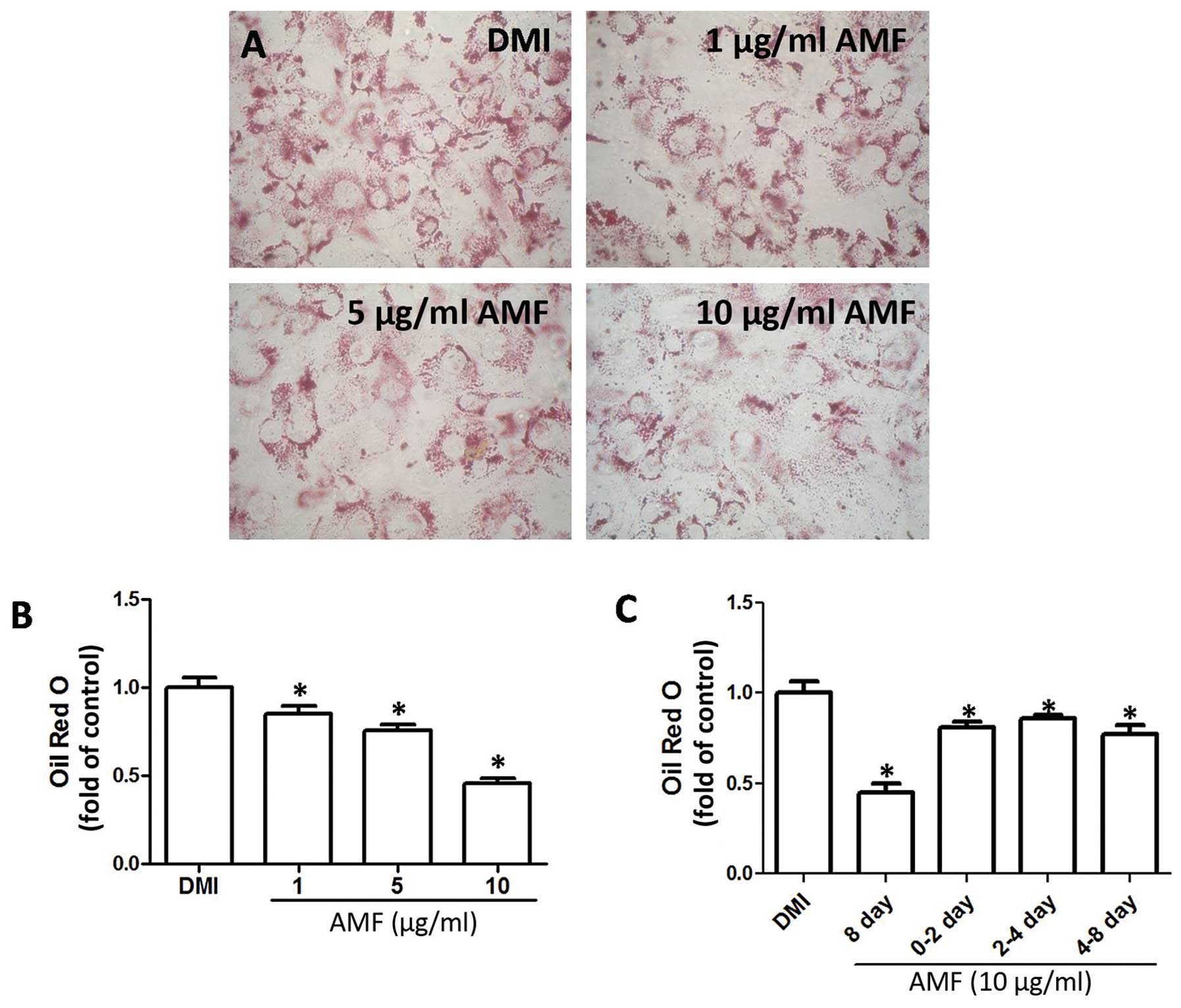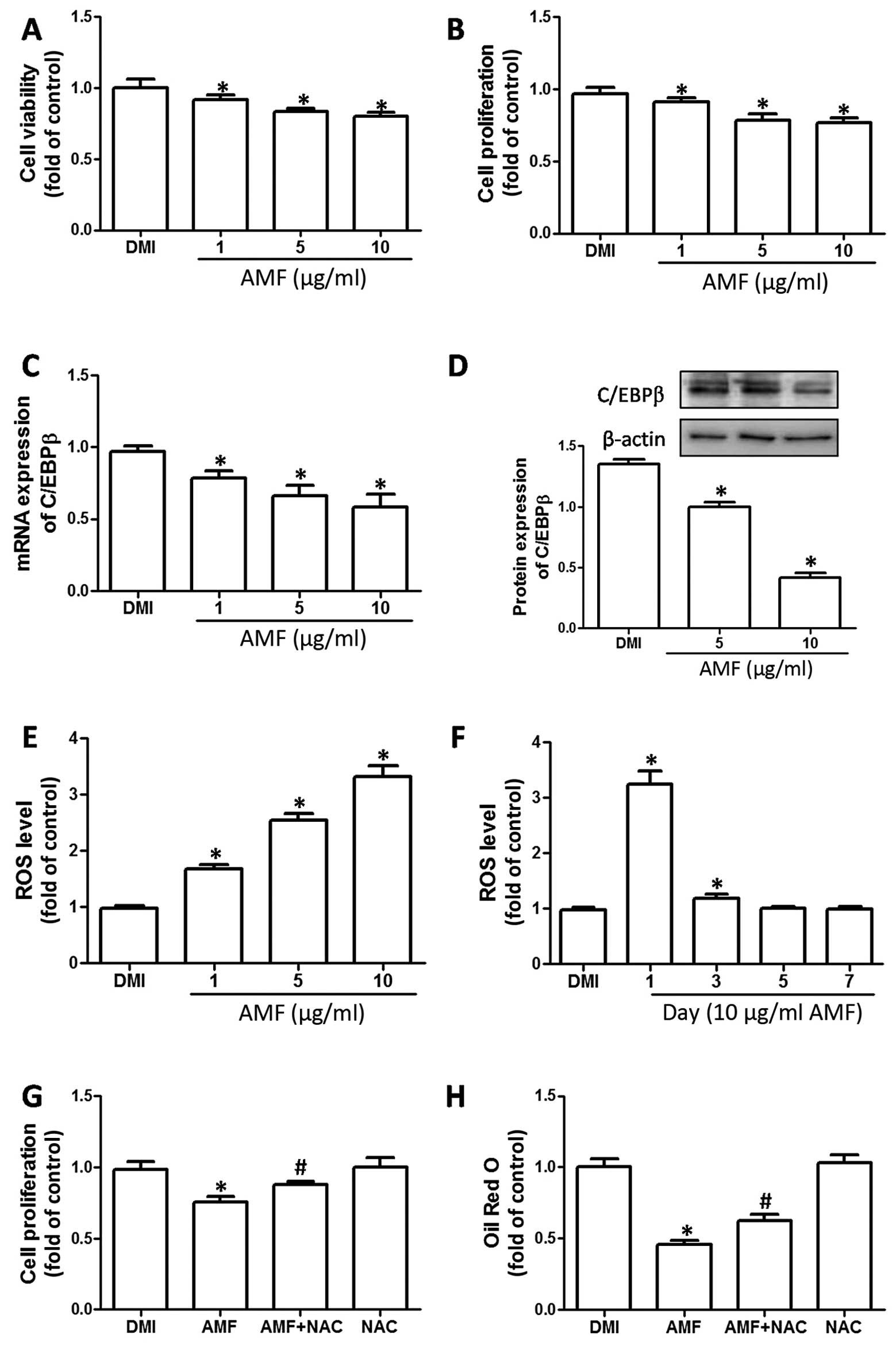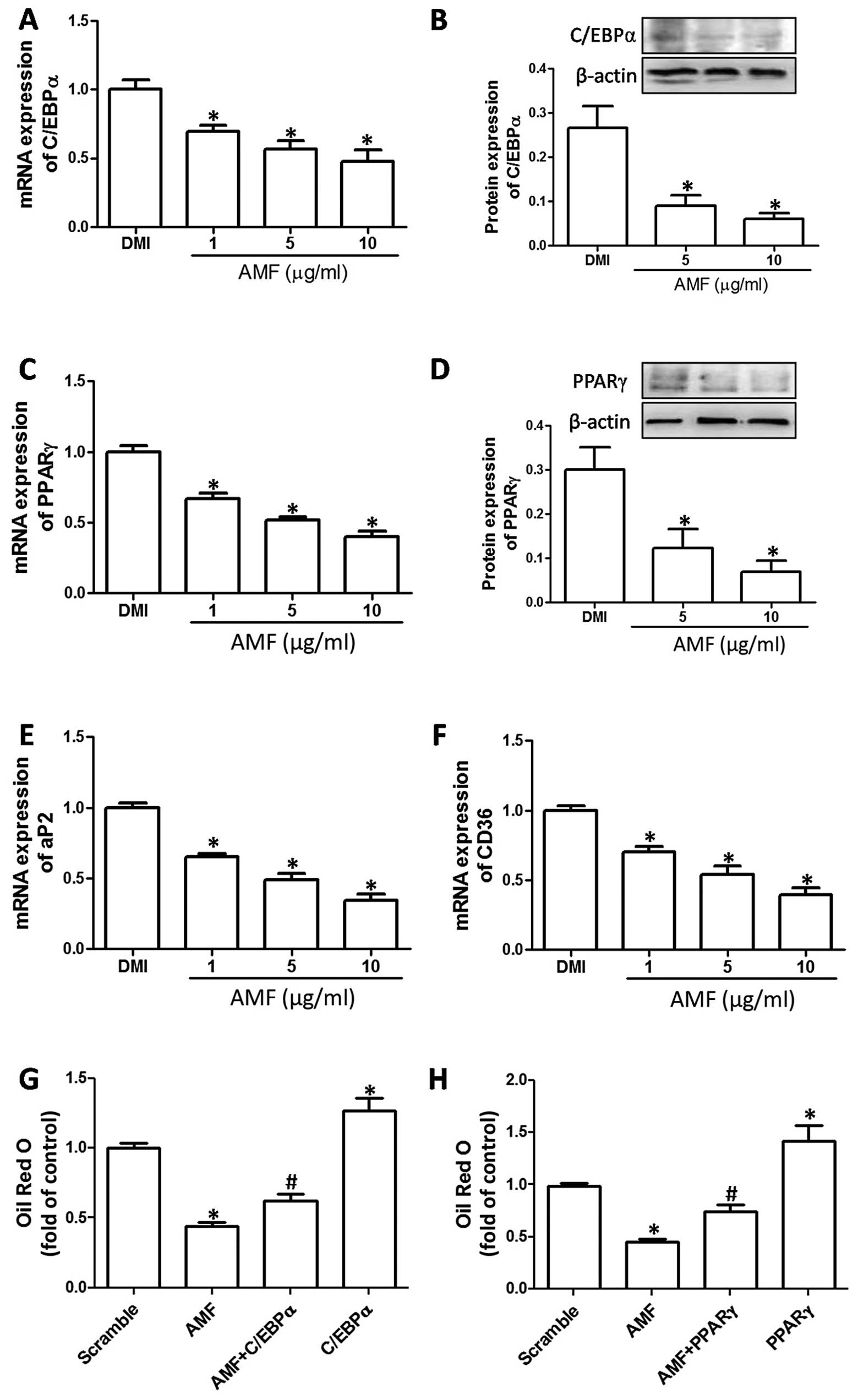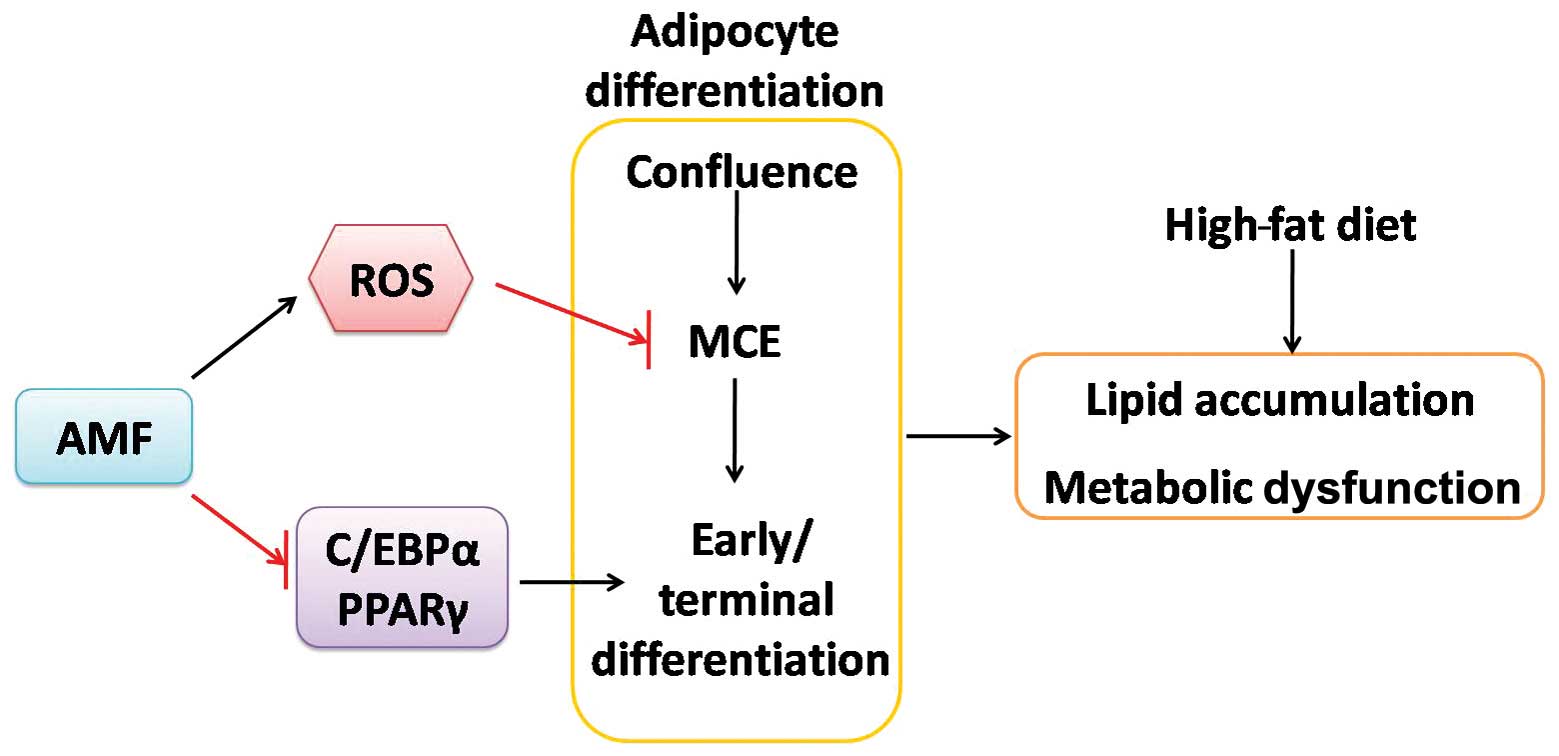|
1
|
Wild S, Roglic G, Green A, Sicree R and
King H: Global prevalence of diabetes: Estimates for the year 2000
and projections for 2030. Diabetes Care. 27:1047–1053. 2004.
View Article : Google Scholar : PubMed/NCBI
|
|
2
|
American Diabetes Association: 6. Obesity
management for the treatment of type 2 diabetes. Diabetes Care.
39(Suppl 1): S47–S51. 2016. View Article : Google Scholar
|
|
3
|
Tseng YH, Cypess AM and Kahn CR: Cellular
bioenergetics as a target for obesity therapy. Nat Rev Drug Discov.
9:465–482. 2010. View
Article : Google Scholar : PubMed/NCBI
|
|
4
|
Wang X and Hai C: Redox modulation of
adipocyte differentiation: Hypothesis of 'Redox Chain' and novel
insights into intervention of adipogenesis and obesity. Free Radic
Biol Med. 89:99–125. 2015. View Article : Google Scholar : PubMed/NCBI
|
|
5
|
Rosen ED, Walkey CJ, Puigserver P and
Spiegelman BM: Transcriptional regulation of adipogenesis. Genes
Dev. 14:1293–1307. 2000.PubMed/NCBI
|
|
6
|
Gregoire FM, Smas CM and Sul HS:
Understanding adipocyte differentiation. Physiol Rev. 78:783–809.
1998.PubMed/NCBI
|
|
7
|
Lefterova MI and Lazar MA: New
developments in adipogenesis. Trends Endocrinol Metab. 20:107–114.
2009. View Article : Google Scholar : PubMed/NCBI
|
|
8
|
Tontonoz P and Spiegelman BM: Fat and
beyond: The diverse biology of PPARgamma. Annu Rev Biochem.
77:289–312. 2008. View Article : Google Scholar : PubMed/NCBI
|
|
9
|
Tang QQ and Lane MD: Activation and
centromeric localization of CCAAT/enhancer-binding proteins during
the mitotic clonal expansion of adipocyte differentiation. Genes
Dev. 13:2231–2241. 1999. View Article : Google Scholar : PubMed/NCBI
|
|
10
|
Yeh WC, Cao Z, Classon M and McKnight SL:
Cascade regulation of terminal adipocyte differentiation by three
members of the C/EBP family of leucine zipper proteins. Genes Dev.
9:168–181. 1995. View Article : Google Scholar : PubMed/NCBI
|
|
11
|
Tanaka T, Yoshida N, Kishimoto T and Akira
S: Defective adipocyte differentiation in mice lacking the
C/EBPbeta and/or C/EBPdelta gene. EMBO J. 16:7432–7443. 1997.
View Article : Google Scholar
|
|
12
|
Tang QQ, Otto TC and Lane MD:
CCAAT/enhancer-binding protein beta is required for mitotic clonal
expansion during adipogenesis. Proc Natl Acad Sci USA. 100:850–855.
2003. View Article : Google Scholar : PubMed/NCBI
|
|
13
|
Clarke SL, Robinson CE and Gimble JM:
CAAT/enhancer binding proteins directly modulate transcription from
the peroxisome proliferator-activated receptor gamma 2 promoter.
Biochem Biophys Res Commun. 240:99–103. 1997. View Article : Google Scholar : PubMed/NCBI
|
|
14
|
Wu Z, Rosen ED, Brun R, Hauser S, Adelmant
G, Troy AE, McKeon C, Darlington GJ and Spiegelman BM:
Cross-regulation of C/EBP alpha and PPAR gamma controls the
transcriptional pathway of adipogenesis and insulin sensitivity.
Mol Cell. 3:151–158. 1999. View Article : Google Scholar : PubMed/NCBI
|
|
15
|
Shao D and Lazar MA: Peroxisome
proliferator activated receptor gamma, CCAAT/enhancer-binding
protein alpha, and cell cycle status regulate the commitment to
adipocyte differentiation. J Biol Chem. 272:21473–21478. 1997.
View Article : Google Scholar : PubMed/NCBI
|
|
16
|
Evans RM, Barish GD and Wang YX: PPARs and
the complex journey to obesity. Nat Med. 10:355–361. 2004.
View Article : Google Scholar : PubMed/NCBI
|
|
17
|
Huang N, Rizshsky L, Hauck CC, Nikolau BJ,
Murphy PA and Birt DF: The inhibition of lipopolysaccharide-induced
macrophage inflammation by 4 compounds in Hypericum perforatum
extract is partially dependent on the activation of SOCS3.
Phytochemistry. 76:106–116. 2012. View Article : Google Scholar : PubMed/NCBI
|
|
18
|
Tsai SC, Liang YH, Chiang JH, Liu FC, Lin
WH, Chang SJ, Lin WY, Wu CH and Weng JR: Anti-inflammatory effects
of Calophyllum inophyllum L. in RAW264.7 cells. Oncol Rep.
28:1096–1102. 2012.PubMed/NCBI
|
|
19
|
Woo ER, Lee JY, Cho IJ, Kim SG and Kang
KW: Amentoflavone inhibits the induction of nitric oxide synthase
by inhibiting NF-kappaB activation in macrophages. Pharmacol Res.
51:539–546. 2005. View Article : Google Scholar : PubMed/NCBI
|
|
20
|
Banerjee T, Valacchi G, Ziboh VA and van
der Vliet A: Inhibition of TNFalpha-induced cyclooxygenase-2
expression by amentoflavone through suppression of NF-kappaB
activation in A549 cells. Mol Cell Biochem. 238:105–110. 2002.
View Article : Google Scholar : PubMed/NCBI
|
|
21
|
Na M, Kim KA, Oh H, Kim BY, Oh WK and Ahn
JS: Protein tyrosine phosphatase 1B inhibitory activity of
amentoflavone and its cellular effect on tyrosine phosphorylation
of insulin receptors. Biol Pharm Bull. 30:379–381. 2007. View Article : Google Scholar : PubMed/NCBI
|
|
22
|
Wang X, Gu C, He W, Ye X, Chen H, Zhang X
and Hai C: Glucose oxidase induces insulin resistance via
influencing multiple targets in vitro and in vivo: The central role
of oxidative stress. Biochimie. 94:1705–1717. 2012. View Article : Google Scholar : PubMed/NCBI
|
|
23
|
Li Q, Peng H, Fan H, Zou X, Liu Q, Zhang
Y, Xu H, Chu Y, Wang C, Ayyanathan K, et al: The LIM protein Ajuba
promotes adipogenesis by enhancing PPARgamma and p300/CBP
interaction. Cell Death Differ. 23:158–168. 2016. View Article : Google Scholar
|
|
24
|
Hou X, Tong Q, Wang W, Xiong W, Shi C and
Fang J: Dihydromyricetin protects endothelial cells from hydrogen
peroxide-induced oxidative stress damage by regulating
mitochondrial pathways. Life Sci. 130:38–46. 2015. View Article : Google Scholar : PubMed/NCBI
|
|
25
|
Erdogan-Orhan I, Altun ML, Sever-Yilmaz B
and Saltan G: Anti-acetylcholinesterase and antioxidant assets of
the major components (salicin, amentoflavone, and chlorogenic acid)
and the extracts of Viburnum opulus and Viburnum lantana and their
total phenol and flavonoid contents. J Med Food. 14:434–440. 2011.
View Article : Google Scholar
|
|
26
|
Xu GH, Ryoo IJ, Kim YH, Choo SJ and Yoo
ID: Free radical scavenging and antielastase activities of
flavonoids from the fruits of Thuja orientalis. Arch Pharm Res.
32:275–282. 2009. View Article : Google Scholar : PubMed/NCBI
|
|
27
|
Yamaguchi LF, Vassão DG, Kato MJ and Di
Mascio P: Biflavonoids from Brazilian pine Araucaria angustifolia
as potentials protective agents against DNA damage and
lipoperoxidation. Phytochemistry. 66:2238–2247. 2005. View Article : Google Scholar : PubMed/NCBI
|
|
28
|
Coulerie P, Nour M, Maciuk A, Eydoux C,
Guillemot JC, Lebouvier N, Hnawia E, Leblanc K, Lewin G, Canard B,
et al: Structure-activity relationship study of biflavonoids on the
Dengue virus polymerase DENV-NS5 RdRp. Planta Med. 79:1313–1318.
2013. View Article : Google Scholar : PubMed/NCBI
|
|
29
|
Ma SC, But PP, Ooi VE, He YH, Lee SH, Lee
SF and Lin RC: Antiviral amentoflavone from Selaginella sinensis.
Biol Pharm Bull. 24:311–312. 2001. View Article : Google Scholar : PubMed/NCBI
|
|
30
|
Lee S, Kim H, Kang JW, Kim JH, Lee DH, Kim
MS, Yang Y, Woo ER, Kim YM, Hong J and Yoon DY: The biflavonoid
amentoflavone induces apoptosis via suppressing E7 expression, cell
cycle arrest at sub-G1 phase, and mitochondria-emanated
intrinsic pathways in human cervical cancer cells. J Med Food.
14:808–816. 2011. View Article : Google Scholar : PubMed/NCBI
|
|
31
|
Siveen KS and Kuttan G: Effect of
amentoflavone, a phenolic component from Biophytum sensitivum, on
cell cycling and apoptosis of B16F-10 melanoma cells. J Environ
Pathol Toxicol Oncol. 30:301–309. 2011. View Article : Google Scholar : PubMed/NCBI
|
|
32
|
Lee CW, Na Y, Park NH, Kim HS, Ahn SM, Kim
JW, Kim HK and Jang YP: Amentoflavone inhibits UVB-induced matrix
metalloproteinase-1 expression through the modulation of AP-1
components in normal human fibroblasts. Appl Biochem Biotechnol.
166:1137–1147. 2012. View Article : Google Scholar
|
|
33
|
Park NH, Lee CW, Bae JH and Na YJ:
Protective effects of amentoflavone on Lamin A-dependent
UVB-induced nuclear aberration in normal human fibroblasts. Bioorg
Med Chem Lett. 21:6482–6484. 2011. View Article : Google Scholar : PubMed/NCBI
|
|
34
|
Jo YH, Choi KM, Liu Q, Kim SB, Ji HJ, Kim
M, Shin SK, Do SG, Shin E, Jung G, et al: Anti-obesity effect of
6,8-diprenylgenistein, an isoflavonoid of Cudrania tricuspidata
fruits in high-fat diet-induced obese mice. Nutrients.
7:10480–10490. 2015. View Article : Google Scholar : PubMed/NCBI
|
|
35
|
de Oliveira PR, da Costa CA, de Bem GF,
Cordeiro VS, Santos IB, de Carvalho LC, da Conceição EP, Lisboa PC,
Ognibene DT, Sousa PJ, et al: Euterpe oleracea Mart.-derived
polyphenols protect mice from diet-induced obesity and fatty liver
by regulating hepatic lipogenesis and cholesterol excretion. PLoS
One. 10:e01437212015. View Article : Google Scholar : PubMed/NCBI
|
|
36
|
Tang QQ, Otto TC and Lane MD: Mitotic
clonal expansion: A synchronous process required for adipogenesis.
Proc Natl Acad Sci USA. 100:44–49. 2003. View Article : Google Scholar :
|
|
37
|
Lee H, Lee YJ, Choi H, Ko EH and Kim JW:
Reactive oxygen species facilitate adipocyte differentiation by
accelerating mitotic clonal expansion. J Biol Chem.
284:10601–10609. 2009. View Article : Google Scholar : PubMed/NCBI
|
|
38
|
Linhart HG, Ishimura-Oka K, DeMayo F, Kibe
T, Repka D, Poindexter B, Bick RJ and Darlington GJ: C/EBPalpha is
required for differentiation of white, but not brown, adipose
tissue. Proc Natl Acad Sci USA. 98:12532–12537. 2001. View Article : Google Scholar : PubMed/NCBI
|
|
39
|
Freytag SO, Paielli DL and Gilbert JD:
Ectopic expression of the CCAAT/enhancer-binding protein alpha
promotes the adipogenic program in a variety of mouse fibroblastic
cells. Genes Dev. 8:1654–1663. 1994. View Article : Google Scholar : PubMed/NCBI
|


















